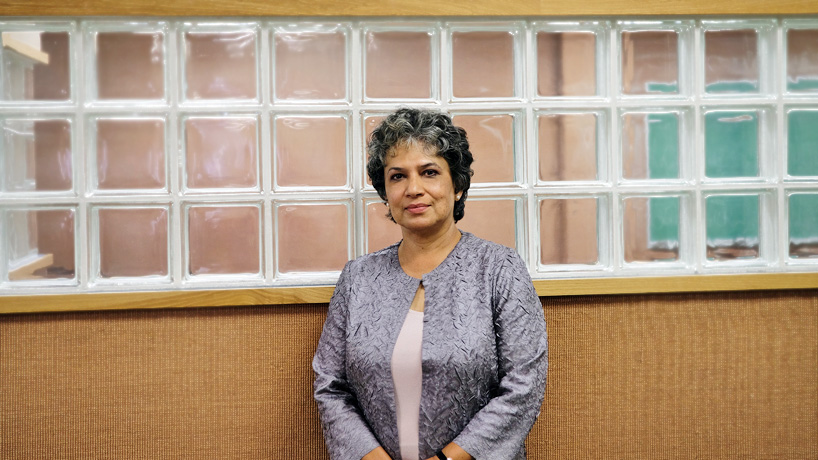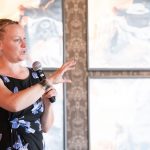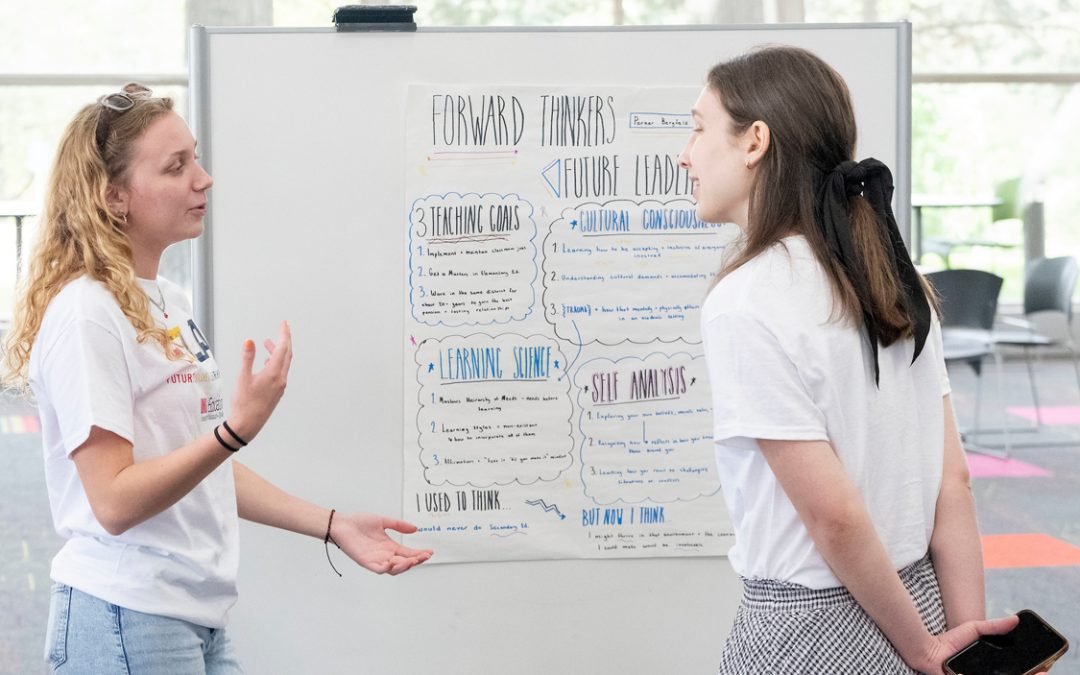
Uma Segal, professor of social work, was awarded the University of Missouri President’s Award for Cross-Cultural Engagement, which honors faculty who promote cross-cultural engagement through education, research and service. Segal’s work has focused primarily on immigrant and refugee populations and global migrations. (Photo by David Morrison)
It’s customary for colleagues to surprise recipients of University of Missouri System President’s Awards with the good news in person.
There was no such fanfare for Uma Segal with campus closing early during the spring semester. But Segal, professor of social work at the University of Missouri–St. Louis, was still quite surprised to learn she had been awarded the UM System President’s Award for Cross-Cultural Engagement.
“The president’s note came through, and I didn’t see it,” she recalled with a laugh. “Then I got the note from Dr. Marie Mora, Provost and Executive Vice Chancellor for Academic Affairs, congratulating me, and I wondered what she was congratulating me about. But it’s a real honor. I’m really appreciative and grateful to receive this. I think what moved me the most is that my School’s peers nominated me and my university colleagues have recognized my contributions in this area.”
The award honors faculty who promote cross-cultural engagement, including international exchanges, through education, research and service. Segal will be formally recognized with other faculty award winners in September during the annual State of the University address and at the Board of Curators meeting on Nov. 19. The award also includes a plaque and a $4,000 prize.
Segal believes the honor acknowledges the major thrust of her research, service and teaching on immigrant and refugee populations and global migrations, as well as her collaborative work internationally. She also credits the continual support of UMSL mentors such as Lois Pierce, professor of social work and former dean of the School of Social Work; Joel Glassman, associate professor emeritus of political science and former director of the Center for International Studies and Programs; and Sharon Johnson, dean of the School of Social Work.
The Nominations Committee in the School of Social Work agreed, believing, cumulatively, her work in the international and cross-cultural areas provided a strong basis for the award.
“I think it’s a combination of things because my research, teaching and service have all focused on cross-cultural, global issues,” Segal said of her international experiences. “I find that when I’m professionally engaged with people in different cultures and different countries, I have the opportunity to interact with individuals at a more substantive level and learn much more than when I travel as a tourist. Over the last 30 years, I’ve really availed myself of several opportunities to travel internationally with the chance of doing something professional.”
In her three decades at UMSL, Segal has published extensively on immigrant and refugee studies in peer reviewed journals and books. She has also published six books on the subject, conducted research, made multiple professional presentations and taught in several countries on all six continents.
Because of her expertise, she was invited to be the Editor-in-Chief of the Journal of Immigrant & Refugee Studies, whose mission she redirected, making it an international and interdisciplinary journal dealing with all areas of human migration.
In the last 20 years, she has lent her expertise to conferences, initiatives and research in diverse countries such as Bulgaria, Brazil, China, India, Italy, Japan, Kazakhstan, Mauritius, Portugal, Scotland and Turkey. Her more than 15 trips to Japan have focused on the unique migration patterns of the Brazilian Japanese, who have been marginalized in both Brazil and Japan. Additionally, her Fulbright Fellowship in India resulted in the design of a new school of social work with a global focus.
It was her recent time in Portugal that stood out most, though. In June 2018, Segal was selected by the Portuguese government’s High Commission for Migration as a Fulbright Specialist. She served as a consultant in assessing areas of strength and opportunities for improvement in the country’s developing refugee integration program.
“I think in many ways, that was a hugely rewarding culmination of all I’ve been doing,” Segal said. “You can conduct research and you can teach, but when your work is actually applied, you feel it is worthwhile – that it makes a difference. That experience was both professionally and personally very meaningful.”
Preceding her travel to Portugal, recognition of her work on human migration led to another prestigious invitation, from an unknown source, to be a keynote speaker for the 1st World Congress on Migration, Ethnicity, Race and Health. Although rather skeptical about such an invitation, she followed up and found herself presenting to an audience of more than 700 health practitioners from around the world. This speaking engagement widened her global network and also led her to further opportunities with the World Health Organization (WHO).
“That July, the coordinator for public health and migration of WHO-Europe invited me to Italy to present a keynote address,” Segal said. “Following that, WHO-Europe invited me to Kazakhstan and, last year, to Turkey as a keynote speaker. Other keynote addresses came from Portugal and Tunisia. When things started rolling, they really started rolling.”
Segal has long been engaged in cross-cultural activities locally as well. For several years, she worked as a project evaluator for the International Institute in St. Louis, and she also participated in a HUD grant received by UMSL to help enhance integration efforts of the Bosnian population in St. Louis. She has developed and taught courses for the Honors College on human migration, global and cross-cultural communication and Asian Americans and their families.
More recently, the Missouri Research Board awarded Segal a grant to work with a theater faculty member, Professor Felia Davenport, to develop a play about refugee experiences in the United States. The project interviewed refugees and people who interact with them – physicians, social workers, teachers and neighbors – to develop a unified story.
A master storyteller has developed the piece, which will be delivered through puppetry. This was originally slated to premiere at the 2020 St. Louis Storytelling Festival, but Segal and Davenport had to pivot after the event was canceled due to COVID-19.
“Now the plan is to livestream it to educate schools and the general public about the refugee experience,” Segal said.
COVID-19 also spurred Segal and her spouse to recruit four friends and to partner with a nonprofit in California to aid those in need during the pandemic.
“We identified two targets that we wanted to help,” she said. “One is African American owned businesses that might be affected, and the other is the unhoused African American population.”
The project, called the STL Coronavirus Meal Drive, was successfully launched and has raised about $23,000. It has connected affected African American owned restaurants to homeless shelters in the area. The project is especially timely, not only in its response to the effects of the pandemic but also in recognizing the evident disparities between the African American community and the rest of the population.
“Given the Black Lives Matter movement following the death of George Floyd mobilizing the nation in a way that I have not seen since the Vietnam War, I believe we directed this project appropriately,” Segal said.
While the past few years have been busy, they have also been incredibly fulfilling.
“The last two years have just been professionally spectacular for me,” Segal said. “It’s like everything that I have done as an academic has dovetailed to allow me to do things in the service area. This is sometimes not valued as much in academia as are research and teaching, but I’m at that point in my career where service that builds on my professional work is really important and rewarding to me.”
She’s also glad that her work with immigrants and refugees over the years has helped people look past surface-level differences to what makes everyone human.
“When I was first working in this area and started going to different countries, I was eager and anxious to learn everything I could about that country,” Segal said. “Over time, I realized that when you connect to people on their humanity and the fact that you’re actually not a whole lot different from them, the relationship is a great deal better than whether you merely learn what to do and what not to do.
“Being aware that people are different but not focusing on that difference is really the key to working with any diverse population because we all feel in the same way. Our environmental circumstances make things different for us, but we certainly have the same feelings, the same fears and the same hopes.”
Segal believes that it is critical for everyone to engage cross-culturally and cross-nationally, value everyone equally and recognize differences but avoid converting these into barriers.
“It is clear during this strange and bewildering period, as we struggle with the COVID-19 pandemic and we find ourselves faced with the reality of the depths of racism and disparity in our nation, we must purposefully open our eyes to the interconnectedness and interdependence of our world, societies and cultures and reach out and across.”














